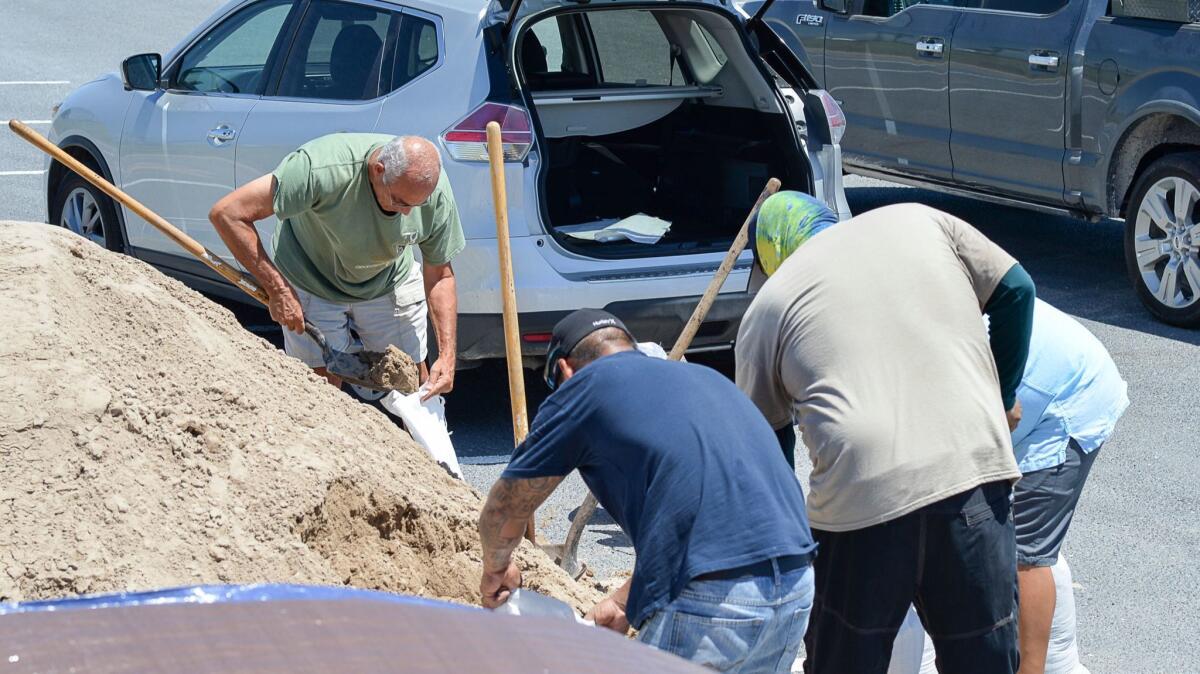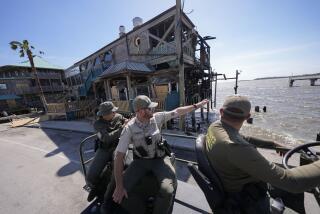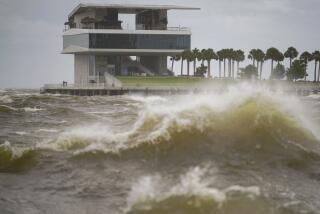Fast-growing, slow-moving Hurricane Harvey takes aim at Texas’ Gulf Coast, threatening up to 35 inches of rain

Hurricane Harvey crept toward the Texas coast late Thursday, threatening torrential rains and punishing winds in what could be the first major hurricane to hit the United States in 12 years.
The National Hurricane Center in Miami forecast “life-threatening and devastating flooding” along the middle Texas coast Friday and over the weekend. Harvey is projected to make landfall late Friday or early Saturday about 70 miles northeast of Corpus Christi near Port O’Connor and Matagorda Bay.
“Preparations to protect life and property should be rushed to completion,” the hurricane center warned Thursday.
Harvey strengthened rapidly in the central Gulf of Mexico on Thursday morning, officially reaching hurricane status by early afternoon. By 7 p.m., the storm was about 275 miles southeast of Corpus Christi, with 85-mph winds, and moving north-northwest at nearly 10 mph.
Forecasters expect Harvey to strengthen into a major, Category 3 hurricane, with winds greater than 110 mph, by the time it makes landfall. Then it is likely to slow down and drop as much as 35 inches of rain across some parts of Texas through next Wednesday.
Harvey could be the first hurricane classified as at least Category 3 to hit the U.S. since Wilma in 2005.
Slow-moving tropical storms and hurricanes have caused some of Texas’ most severe flooding. In 2001, Tropical Storm Allison hovered above the Houston area for days, bringing up to 30 inches of rain and causing some of the worst flooding in the city’s history.
On Thursday, Texas Gov. Greg Abbott preemptively declared a state of disaster for 30 Texas counties.
Louisiana Gov. John Bel Edwards followed suit Thursday, declaring a state of emergency for the entire state.
“All arms of the state’s emergency preparedness and response apparatus are planning for the serious threat posed by Hurricane Harvey, and we are calling on all Louisianans throughout the state to do so as well,” Edwards said.
A hurricane warning is in effect for Port Mansfield to Sargent, Texas, and a storm surge warning is in effect for Port Mansfield to High Island, Texas.
Coastal communities across Brazoria, Calhoun and Matagorda counties were already mandatory evacuation orders. In Corpus Christi, Mayor Joe McComb issued a voluntary evacuation order.
With major cities such as Houston forecast to see close to 20 inches of rainfall, local officials have warned of dangerous flash flooding.
The Houston Fire Department is preparing evacuation boats, the Police Department is readying high-water rescue vehicles, and the Public Works Department is identifying scores of intersections that are prone to flooding.
Houston’s Office of Emergency Management advised residents to stockpile water, food and medication for five to seven days, secure anything that could be picked up by the wind, and park vehicles off the streets.
Jarvie is a special correspondent.
ALSO
Farmed Atlantic salmon escape into Washington state waters. Here’s why fishermen are worried
Federal judge tosses out Texas voter ID law supported by Trump administration
Seniors, buy a lifetime federal lands pass now. The price will jump from $10 to $80
UPDATES:
8:15 p.m.: This article was updated with details about the hurricane’s path and preparations for the storm.
3:20 p.m.: This article was updated with Harvey becoming a hurricane, the latest forecasts for landfall and rain totals, information on storm preparations, and to reflect that the last major hurricane to hit Texas was Rita in 2005, as Ike was not considered a major hurricane.
10:35 a.m.: This article was updated with meteorologists at the National Hurricane Center saying Tropical Storm Harvey is now Hurricane Harvey and winds have reached 80 mph.
10:20 a.m.: This article was updated with the National Hurricane Center forecasting Tropical Storm Harvey will become a hurricane.
This article was originally published at 5:45 a.m.
More to Read
Sign up for Essential California
The most important California stories and recommendations in your inbox every morning.
You may occasionally receive promotional content from the Los Angeles Times.











